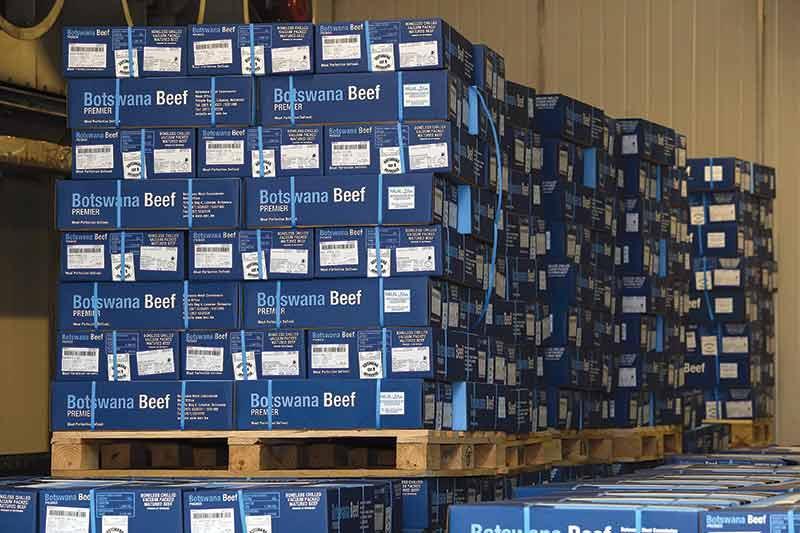Africa-Press – Botswana. On a game show of his that enjoys international patronage, Steve Harvey has told the world that Botswana has the tastiest beef in the world. The American talk show host may have been currying favour with the powers-that-be at the Office of the President to snag the now controversial P470 million deal. Whatever the case, Harvey was also telling unalloyed truth: Botswana’s beef is indeed the tastiest in the world bar none and many more outsiders have attested to that.
Once when (perhaps) feeling peckish, the late newspaper publisher, William Jones, rhapsodised about Ecco, the Botswana Meat Commission (BMC) canned beef. Jones, who founded Botswana Guardian, The Midweek Sun and the now defunct Echo also happened to know a fellow Gaborone-based Briton who stuffed cans upon cans of the beef (Ecco) when he visited the United Kingdom. Botswana beef got another thumbs-up from a Brit in 2015 when the European Union delegation to Botswana hosted a day-long seminar for journalists at Sanitas Nursery and Garden Centre in Gaborone. In the course of a presentation on European Union trade relations with Botswana and the economic partnership agreements, John Taylor, happened to mention that Botswana beef has a “unique taste”. Taylor, a United Kingdom national who is Trade Counsellor at the Europe Delegation to Botswana, added though that most people in Europe don’t know about Botswana beef and that if the branding of the product was developed to the desirable standard, “its price would go up.” A South African delegate attending a Southern African Trade Union Coordinating Council seminar at the Tlotlo Hotel and Conference Centre in 2013 remarked that “Botswana’s seswaa is much more delicious than ours.”
The deliciousness has to do not the way Batswana prepare this dish but with the quality of the beef. This quality is a direct result of Botswana’s cattle being grass-fed. That fact is acknowledged by the Botswana Meat Commission which, on its website, says that the free range and natural farming methods (which are mostly used by Botswana subsistence farmers) “ensure full–flavoured, lean beef of highest quality.” Ironically, it is the same BMC that is compromising that advantage at the behest of the EU. That concern is raised in an African Development Bank report that analysed Botswana’s food and agriculture delivery systems.
“BMC’s pricing policy favours weaners compared with more mature cattle. This encourages farmers to sell their young stock, driving the trend towards feedlotting. This trend may turn out to be counterproductive in the long term as more premium priced segments in export markets demand more naturally grown beef. Some argue that the drive towards feedlotting threatens to undermine Botswana beef’s positioning as a premium brand,” the AfDB report says.
Through a €6 million Economic Partnership Agreement (EPA) between the Southern African Development Community and the EU that ends next year, Botswana aims to increase its export-led growth. This EPA supports the beef and leather value chains. In as far as Botswana’s world-famous beef goes, this is coming at a cost. As the AfDB report states, increased sales to the EU entails more feedlotting in order “to ensure export compliance and guarantee consistent quality and supply.” The feedlotting is a double-edged sword because while it provides strong potential for Botswana’s beef exports to recover post-Covid, it also compromises the quality of the beef whose main attraction (even to EU customers) is its taste, taste that is a direct result of the cattle being grass-fed.
For what it is worth, the report notes that there is a planned public-private grass-fed beef cluster initiative between BMC and a private sector fresh produce company that seeks to offset the problem that feedlotting poses.
“The liberalization of marketing, the expected revival of the beef export industry and the growing concern for animal welfare in developed country markets should all be signals to the partners to revisit and revive this initiative,” it adds.
The AfDB report also says that feedlots are also costly to run, “particularly in Botswana where supplements are predominantly imported.”
A growing number of people, some farmers, strongly feel that Botswana’s reliance on the EU market for is beef exports is not really beneficial to the country. While the most lucrative, this export is also the most stringent in terms of requirements. As even a former BMC CEO has publicly asserted, the cost of meeting these requirements is prohibitive and has taken a toll on the Commission. It has also taken a toll on the Ministry of Agriculture (MoA) which periodically has to go to considerable expense to meet EU requirements.
In 1997, the Union insisted that for meat to be exported to its market, livestock traceability rules had to be tightened. The result was that each animal was issued a unique identification number, and all animal movements and holding areas had to be registered in a database. Resultantly, MoA introduced an advanced traceability system through which boluses were inserted into animals’ stomachs. The latter system was abandoned in 2013 in favour of a digital ear tagging system.
AfDB itself says that compliance with EU regulations “is no simple matter” for Botswana. The Bank notes that the Botswana National Veterinary Laboratory is not fully equipped to carry out all the necessary tests – like those for hormones and chemical residues. As a result, the laboratory must outsource some of these tasks – which is costly and can cause delays.
The Bank also raps BMC management on the knuckles for disrupting the beef value chain through its monopoly on exports.
“BMC is alleged to have become complacent and inefficient, riding on its export monopoly and guaranteed EU market. The lack of competition discourages innovation and puts a stranglehold on the private sector, particularly the smaller players for whom it is more difficult to overcome constraints.”
On the rosier side, the Bank notes that demand for beef is likely to continue to rise in developing countries where populations are growing and incomes are increasing.
“There is potential to further develop regional trade in beef and beef products, notably with the Democratic Republic of Congo which has been meeting with the BITC to discuss increasing imports. Botswana has recently begun exporting to China where there is huge potential to increase volumes, and there are further opportunities to explore in the Middle East,” says the Bank, adding that in order to take advantage of these opportunities, the Ministry of Foreign Affairs and MoA’s Department of Agri-Business Promotion “should be proactive in forging appropriate relationships with governments and importers in these countries and regions.”
For More News And Analysis About Botswana Follow Africa-Press






